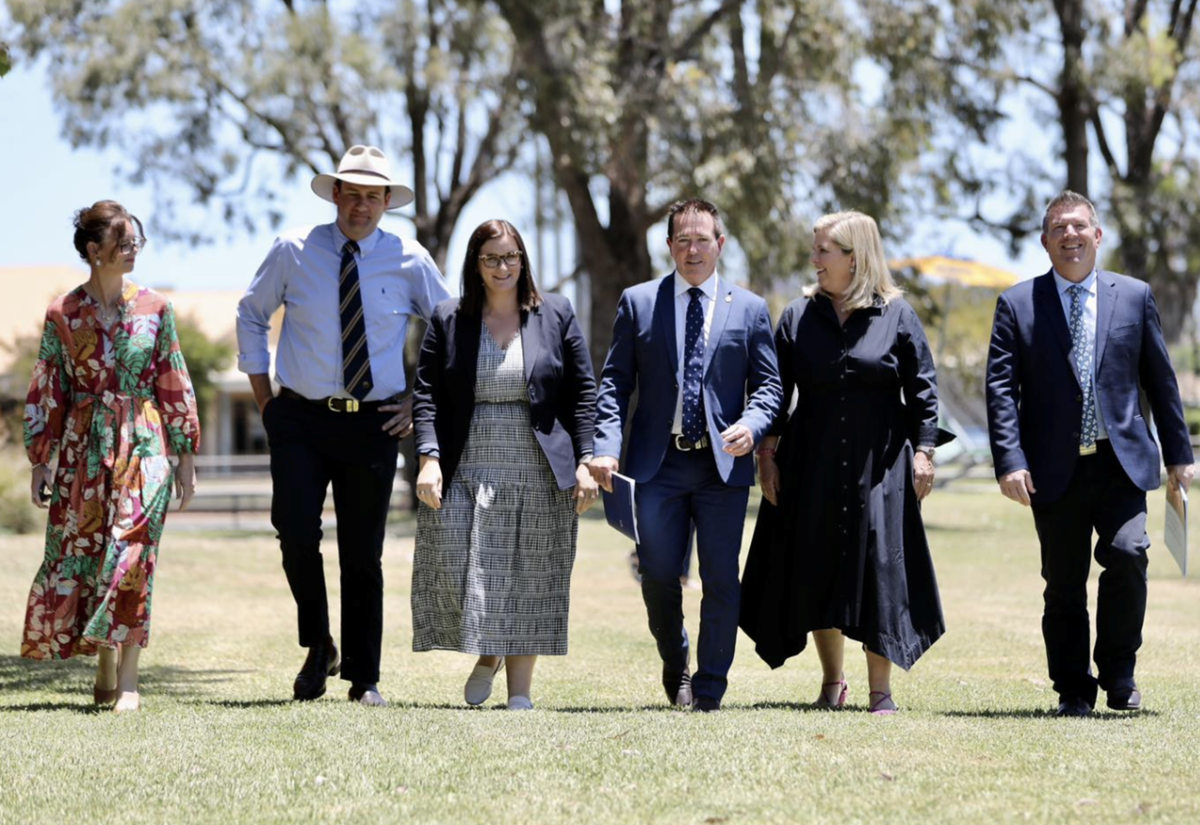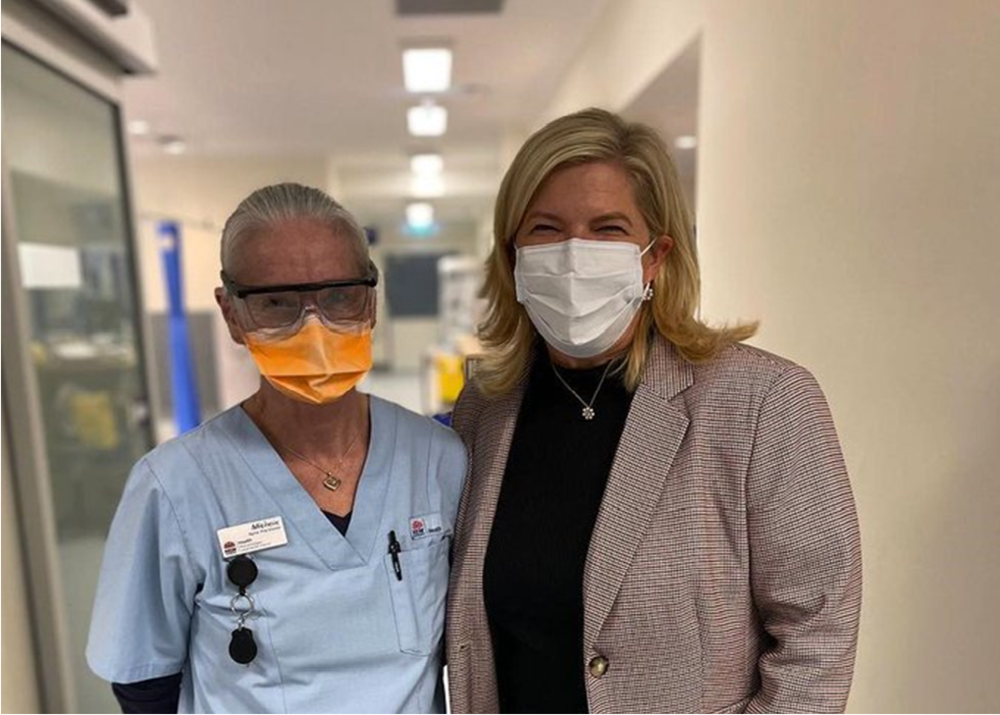Their 'Vision' for Regional Communities
Lucy Kirk
07 January 2023, 9:17 PM
 NSW Government's leaders announced a new 'vision' for regional communities in Dubbo on Friday 25th November.
NSW Government's leaders announced a new 'vision' for regional communities in Dubbo on Friday 25th November. A 'vision' for regional NSW was announced by the Deputy Premier and Minister for Regional NSW Paul Toole in Dubbo on Friday 25 November and communities in the west will be considering what might be in store after the election in March.
The 'Vision for Regional Communities Action Plan 2023-25,' lays out key strategies for making Regional NSW more liveable, some which are already underway and others that have just recently been announced.
Investment in housing, upskilling and growing the health workforce, ensuring equitable access to quality learning, improving regional transport networks and digital connectivity are the focus of the vision.
“This is a wide-reaching document, touching almost every aspect of life in regional Australia,” said RAI CEO Liz Ritchie, who was Master of Ceremonies at the event.
While the document provided an overview of a number of announcements already made public in the NSW government's 2022-23 budget, the ceremony was used to announce a number of additional strategies:
- A new welcome experience to be piloted across eight regional locations to support key workers to relocate to the regions and put down roots
- A $5 million investment in scholarships to upskill existing health workers and attract new staff to regional communities
- A trial of contactless payments on regional bus services in Dubbo and Bathurst to make services easier to use
'Welcome Experience' Pilot
A 'welcome experience' for teachers, healthcare professionals and police will be piloted in eight locations including Broken Hill, Walgett, Coffs Harbour, Muswellbrook, Goulburn, Griffith, Corowa and Bega next year with the goal of rolling it out across more locations in 2024.
The welcome experience is intended to help attract, prepare and retain key workers in regional NSW.
“The bush is renowned for its hospitality but moving to a new town can be daunting, especially with a family,” Mr Toole said.
“That’s why the NSW Government is upping the ante with this new program to ensure key workers who provide so much support to our communities are given the best possible support to relocate and feel welcome," he said.
Minister for Regional Health and Mental Health Bronnie Taylor said this service introduces key workers to a friendly face before they make the move to regional NSW.
“From the moment our key workers make the decision to move to the bush, they will be partnered with locals who will make the transition so much easier,” Mrs Taylor said.
“From being on hand to assist in navigating their new community to helping create social connections or even accessing vital services such as childcare, healthcare or helping their partners find a job, this service will make a huge difference."
Deputy Premier Sarah Boorer advised that the program will tailored to individual and community needs.
"The program will work with Councils, community organisations and other service providers to ensure the program is localised to each area."
"Further details on how the program will be run in each area will be available in early 2023, once tenders have been assessed," she said.
$5 million investment in scholarships
$5 million in scholarships to upskill existing health workers and attract new staff to regional communities was also a key announcement.
“Our Government recognises that working in healthcare in the regions is completely different to working in the city,” Mr Toole said.
“That’s why this program has been specifically designed for rural and regional health workers. We want our health workforce to feel supported and provide them with the opportunity to upskill or retrain while staying connected to our communities.
“This program is also targeting new workers, with scholarships to cover the cost of travel and accommodation, childcare, technology and training fees- aimed at making it easier for students to choose to move away from the city.”
Minister for Regional Health Bronnie Taylor said the program will not only attract new staff to the regions but support existing healthcare workers.
“From Bourke to Bega, I’ve heard loud and clear that our health workers want to be provided with the opportunities to advance their careers without having to leave their families, their workplace and their communities,” Mrs Taylor said.
“These scholarships are flexible to individuals needs and are available across a range of health professions including allied health, nursing and midwifery and Aboriginal healthcare.
Places like Nyngan, where hospital beds remain closed as a result of persistent staff shortages, will be looking to see whether outcomes from initiatives like this will be arriving in the short term.

Minister for Regional Health Bronnie Taylor is excited about the potential of the Health Scholarships to upskill existing health workers and attract new staff to regional communities.
Contactless Payments on Public Transport
A trial of contactless payment methods on buses in Bathurst and Dubbo will help make public transport more accessible for many locals.
The trial will start in early 2023 allowing customers to pay their fare by “tapping” their credit or debit card, phone or watch when boarding the bus.
Deputy Premier, Minister for Regional NSW and Member for Bathurst Paul Toole said buses across both Bathurst and Dubbo will be fitted with the technology, giving people more flexibility when paying for their trip.
“So many of us don’t carry cash now – this will mean when you jump on a bus, you have the choice to tap your card or device to pay for your journey instead.
“If the trial is successful, up to 300 fare-paying buses across rural and regional areas could be considered for contactless card reader technology.”
Customers will still be able to pay in cash during the card-based contactless payment trial.
This may assist residents from smaller western plains communities when visiting Bathurst and Dubbo but, with bookings required on Trainlink buses, the 'tap-on' experience is unlikely to be extended to those inter-town services.
These latest announcements join forces with a number of other strategies to form the 'vision' for regional NSW.




